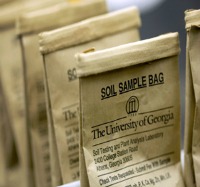Ag Testing Services
 The University of Georgia Cooperative Extension Laboratories exist to support Georgia clients with accurate analysis for objective decisions and problem solving related to agriculture, horticulture and the environment.
The University of Georgia Cooperative Extension Laboratories exist to support Georgia clients with accurate analysis for objective decisions and problem solving related to agriculture, horticulture and the environment.
We conduct tests on a wide variety of materials including soil, plant, water, animal feedstuffs, animal wastes and many others. Samples must be submitted through the County Extension Office.
Soil Samples
Cost for a Routine Soil Test is $7.00.
Our Soil Testing for Home, Lawns, Garden and Wildlife Food Plots publication gives information on how to take soil samples. After you take your sample, bring it by the office and we will send it to the UGA Soil Testing and Plant Analysis Lab for analysis of your soil. It takes 7-10 days to get the results. We will be glad to email your results to you for quicker turn around time.
Water Samples
Cost for a Basic Water Test is $25.00. This test is a routine mineral analysis of your water. Stop by our office for a container for you to take your sample and check out our water quality publication series which includes Home Water Quality and Treatment. We offer more in-depth water test too.
Insect Identification
Proper diagnosis is necessary to achieve good pest management. It's important to remember that only a small percentage of insects on plants are pests.
Feed and Forage Testing
Nematode Testing
Nematodes cause roots to become knotted and galled and impair the root system so that water and nutrients cannot be taken up. Nematode damaged plants become stunted, turn yellow and wilt in hot weather.
The best time to determine if you have a nematode problem is in the summer and fall, when nematodes are most numerous. Homeowner/Farmer Nematode Test cost is $30.00 and Commercial Nematode Test cost is $45.00.
Plant Tissue Analysis
Several tests can be performed through leaf tissue analysis. Costs for the tests are dependent upon which test is selected. Results in most cases will be returned in approximately two weeks along with applicable recommendations for any problems discovered.
Plant Identification and Plant Disease Identification
Plant identification is critical for Integrated Pest Management (IPM) and the proper use of pesticides in agriculture and horticulture situations. It is also helpful to the clientele that just want information on that weed, flower, shrub or tree growing in their landscape.
Disease organisms such as fungi, bacteria, and viruses can damage and/ or kill a wide variety of plant materials in Georgia. It is essential to identify the organism accurately before implementing control strategies.
Tips for Submitting Plant Specimens
When possible, collect a generous sample of the plant's stem with leaves still attached. Try to include any flowers, fruits, cones or buds of the plant. Deliver the specimen fresh to the county Extension Office. Plant samples may not be identifiable if they have been crushed, decayed or dried and shriveled. To assist in obtaining a rapid, accurate identification of plant specimens, be sure to bring the following information:
- Description of site where plant was collected. (Sun/shade, natural area/landscape, wet/dry area etc.)
- Your name and address.
- Date it was collected.
- Description of plant (size, shape, description of flowers, etc.).
- Stage of growth: seedling, blooming, fruiting.
For more information on testing services offered through our office give us a call at (478) 862-5496.
